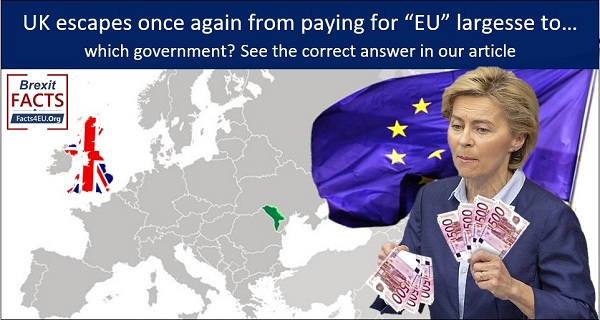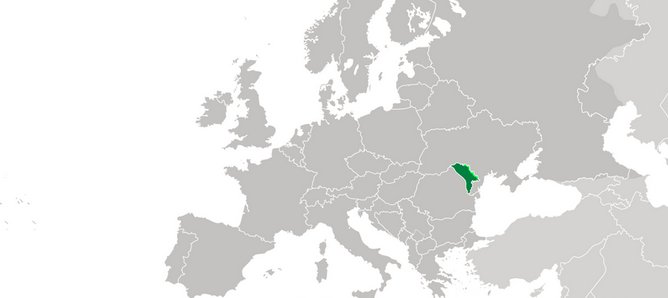Brexit bonus: UK escapes once again from paying for 'EU' largesse
Another payment to Brussels avoided – money which can now be used in the UK

Montage © Facts4EU.Org 2022
A small example of how British money was regularly used by the EU Commission, badged as ‘EU’ generosity
Have you heard of Moldova? Do you know where it is? Well, in recent years the EU has thrown hundreds of millions to Moldova in the form of grants and loans – money badged as “from the EU” but in reality funded to a significant degree by the unknowing generosity of the British public.
Last week the EU Commission in Brussels, led by Ursula von der Leyen, announced another tranche of money it proposes to provide to the Moldovan government.
This example is relatively small, but is an example of the regular use of UK funds for EU purposes
Every week for many years the Facts4EU.Org team has recorded announcements of ‘EU funding’ coming out of Brussels and going outside the EU. Sometimes these funds amounted to many billions. Sometimes they were ‘merely’ a few hundred million.
They all mounted up to many hundreds of billions of pounds. Below is just one small example from last week.
Brexit Facts4EU.Org Summary
Former Soviet Republic of Moldova
- Population: 3m
- Language: Romanian
- Area: 13,000 square miles (UK: 94,000 square miles)
- Moldovan GDP: $12bn
- UK GDP: $3,108bn – 251 times larger than Moldova
- Moldova ranks 141st in the World for GDP, according to the IMF
Sources: UN, IMF 2021 estimates
Small, but typical of so many
Last week, following a request by the Republic of Moldova, the European Commission adopted a proposal for a new Macro-Financial Assistance (MFA) operation of up to €150 million. This is on top of the EU Economic Recovery and Resilience Plan for Moldova of up to €600 million for the next three years – part of which will be paid by the British taxpayer as part of the ‘Divorce Bill’ which was agreed by Theresa May when she was still Prime Minister.
The latest decision from the EU Commission on funding for Moldova will not form part of the UK’s ‘Divorce Bill’, thanks to Brexit.
Paolo Gentiloni, Commissioner for the Economy, said on Tuesday last week:
“The European Commission continues to stand by the people of Moldova in these particularly challenging times. Alongside the new IMF programme, this proposed new Macro-Financial Assistance would provide both grants and loans at favourable rates to help support the Moldovan economy in the coming two years.
“As ever, this financing would be conditional on the fulfilment of policy commitments aimed at addressing some of the most pressing problems weighing on Moldova's economic development.”

Moldova is being lined up for EU membership
Moldova sounds like the kind of invented country name from which a secret organisation of dastardly villains would set out to challenge Secret Agent 007.
It is in fact real and was part of the former Soviet Union. If its name sounds contrived that is possibly because it was only chosen in 1991 when it became independent. The Republic of Moldova is extremely poor, corrupt, and with democratic deficiencies.
Moldova is thus a perfect candidate for membership of the European Union. As part of this process it entered into an ‘Association Agreement’ with the EU which was signed on 27 June 2014 and entered fully into force on 1 July 2016.
Geography
The Republic of Moldova borders Romania, which joined the EU in 2007. It is therefore perfectly conceivable that the EU should wish to bring this new member’s neighbour into the orbit of the European Union.
© Brexit Facts4EU.Org 2022 - click to enlarge
Moldova also neighbours the Ukraine. Many blame the EU’s clumsy attempts at bringing Ukraine into its orbit, for Russia’s current conflict there. Moscow seized the Crimean peninsula back in 2014 and has been arming its rebels in Eastern Ukraine since then.
Moldova is one of the poorest countries in the world – certainly it's the poorest in Europe. It ranks 141st out of the 213 countries listed in the IMF’s GDP list for 2021. Above it in that table you will find economic powerhouses such as Nicaragua, the Congo, and Equatorial Guinea.
Observations
Yes, this is a relatively small expenditure by the EU in comparison to the billions it spends each year, but this latest disbursement is another in a long line.
Importantly it is now another payment which the British public will no longer have to subsidise.
There is a general misconception surrounding how much the UK used to pay to the EU – that it was a fixed amount relative to a formula based on economic performance, agricultural sector and other factors. The problem with this is that, well, it’s only part of the story, it’s not the whole truth.
The amount of treasure the UK (and other countries) handed over to Brussels was indeed calculated by a formula – but there were ALSO a series of add-ons, some of which might be known and predictable but were considered outside the annual payment, and others that were simply not known and planned for.
Add-ons could be projects outside the membership fee that were obligatory, such as Foreign Aid – usually given the progressive title ‘development aid’, although much of it did not go on or lead to any ‘development’ but found its way to dictatorships without any audit trail or accountability.
The funding of Moldova is an example of an additional commitment that the EU would regularly take on in support of its own agenda – this time in its craving for territorial gain to expand EU membership. It’s rather like the US buying Alaska from Russia for $7.2m in 1867 but not admitting it as the 49th State until 1959.
It is these sorts of additional expenses – many of which have little obvious geo-political or strategic interest for the UK – that we are now no longer committed to. They previously went unnoticed and unremarked. But the tab was still picked up by British taxpayers. In the scheme of things they may not have moved the UK’s deficit dial a great deal – but rolled-up together they sure did. And now we are shot of them. That’s what you call a Brexit Bonus and the type of commitment we should never go back to.
We researched and wrote the above piece while working on an important piece of research we will be publishing tomorrow. Watch this space!
Facts4EU.Org needs you today
We are a 'not for profit' team (we make a loss) and any donation goes towards the actual work, not plush London offices, lunch or taxi expenses, or other luxuries of some organisations.
We badly need more of our thousands of readers to donate. Could this be you, today? Maybe you've been thinking about it, but just haven't got around to doing it? If so, let us reassure you. It's quick and easy and we use two highly secure payment providers. And we do NOT ask you for further donations if you donate once - we just hope that you keep supporting us. Your donation stays anonymous unless you tell us otherwise.
Please don't assume that other people will keep us going - we don't receive enough to survive and we need your help today. Could you help us?
Most of our readers are well-informed and appreciate our fact-based articles, presented in a way you won't see anywhere else. If you value reports like the one above, please help our work with a donation. We have far more to do in researching, publishing, campaigning and lobbying Parliament than we have in terms of the financial resources to fulfil these tasks. We badly need funding to continue - we rely 100% on public donations from readers like you.
If you believe in a fully-free, independent, and sovereign United Kingdom, please make a donation now. It’s quick, secure, and confidential, and you can use one of the links below or you can use our Donations page here. You will receive a personal, friendly ‘thank you’ from a member of our team within 24 hours. Thank you for reading this.
[ Sources: EU Commission | IMF | UN ] Politicians and journalists can contact us for details, as ever.
Brexit Facts4EU.Org, Wed 12 Jan 2022
Click here to go to our news headlines
Please scroll down to COMMENT on the above article.
And don't forget to actually post your message after you have previewed it!
Since before the EU Referendum, Brexit Facts4EU.Org
has been the most prolific researcher and publisher of Brexit facts in the world.
Supported by MPs, MEPs, & other groups, our work has impact.
We think facts matter. Please donate today, so that we can continue to ensure a clean Brexit is finally delivered.
Paypal Users Only - Choose amount first
Quick One-off
Monthly



Something to say about this? Scroll down for reader comments